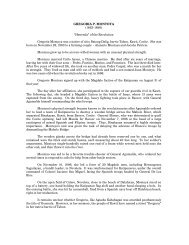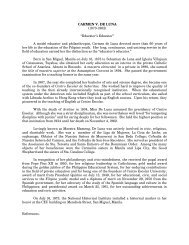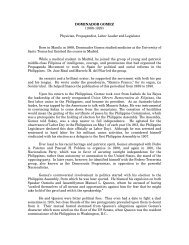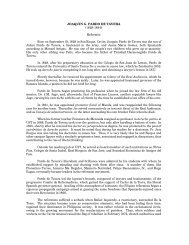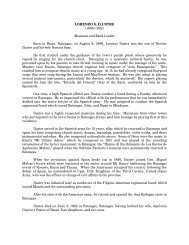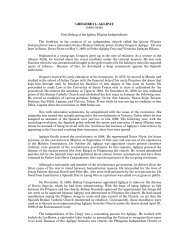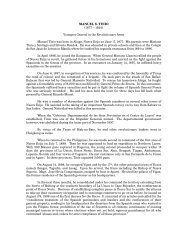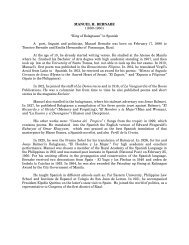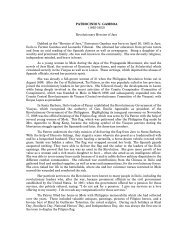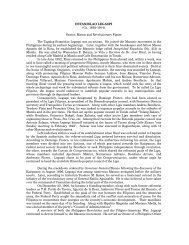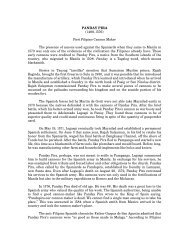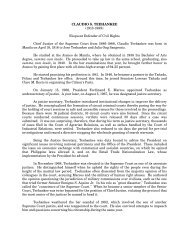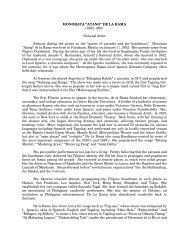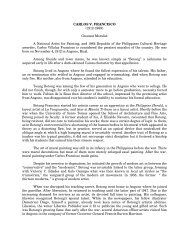ARCADIO N. DEL ROSARIO (1846-1923) Eloquent Advocate of The ...
ARCADIO N. DEL ROSARIO (1846-1923) Eloquent Advocate of The ...
ARCADIO N. DEL ROSARIO (1846-1923) Eloquent Advocate of The ...
Create successful ePaper yourself
Turn your PDF publications into a flip-book with our unique Google optimized e-Paper software.
<strong>ARCADIO</strong> N. <strong>DEL</strong> <strong>ROSARIO</strong><br />
(<strong>1846</strong>-<strong>1923</strong>)<br />
<strong>Eloquent</strong> <strong>Advocate</strong> <strong>of</strong><br />
<strong>The</strong> Separation <strong>of</strong> the Church and State<br />
Lawyer, diplomat and framer <strong>of</strong> the Malolos Constitution, Arcadio del Rosario y Narciso<br />
was born on November 13, <strong>1846</strong> in Pandacan. He was the son <strong>of</strong> Bonifacio del Rosario and<br />
Severina Narciso. He studied at the Colegio Real de San Jose and the University <strong>of</strong> Santo<br />
Tomas, where he obtained his law degree.<br />
Del Rosario served as sub director <strong>of</strong> internal revenue and, later, as notary public for the<br />
provinces <strong>of</strong> Pampanga and Tarlac. A mason, he was initiated into the brotherhood in February<br />
1892 and joined the Compromisarios, a group headed by Numeriano Adriano, which sought<br />
political reforms from the colonial government, just before the outbreak <strong>of</strong> the 1896 Revolution.<br />
He joined the revolutionary cause in1897 as one <strong>of</strong> the Filipino exiles, who composed the Hong<br />
Kong Committee. <strong>The</strong> latter served as a government-in-exile for Aguinaldo and his followers<br />
after the Pact <strong>of</strong> Biak-na-Bato.<br />
Dissension rose within the group following Commodore George Dewey’s victory over the<br />
Spanish fleet in the Battle <strong>of</strong> Manila Bay. It split into two factions, one favoring the annexation<br />
<strong>of</strong> the Philippines to the United States, the other that <strong>of</strong> independence. Del Rosario and some <strong>of</strong><br />
his fellow exiles like Jose Ma. Basa, Gracio Gonzaga, Doroteo Cortes, and Maximo Cortes and<br />
his wife Eustaquia, <strong>of</strong>fered their money to the U.S. In a letter dated 6 May 1898, Rounseville<br />
Wildeman, the American consul at Hong Kong, endorsed their statement <strong>of</strong> support to the<br />
United States to his superiors.<br />
In a decree issued August 1898, he was named member <strong>of</strong> the Revolutionary Committee.<br />
<strong>The</strong> following month, he was named head <strong>of</strong> the <strong>of</strong>fice “General Driection” under the Treasury<br />
Department headed by Mariano Trias, <strong>of</strong> the Revolutionary government. He was “Special<br />
Commissioner” by December <strong>of</strong> the same year. As head <strong>of</strong> the Registry Division <strong>of</strong> the Treasury<br />
department, he ordered the Provincial Chief <strong>of</strong> Infanta in January 1899 to turn over the<br />
collected taxes and funds to the “Central Treasury”.<br />
Upon his return to the Philippines, Del Rosario was named peace commissioner <strong>of</strong> the<br />
revolutionary government. His job was to establish peace in the Central Luzon area. Later, he<br />
became a member <strong>of</strong> the notarial board <strong>of</strong> the short-lived Universidad Literaria de Filipinas,<br />
which was created in 1898. As a delegate to the Malolos Congress, Del Rosario was active<br />
during the deliberations on the proposed constitution. He advocated woman’s suffrage and<br />
other political rights and vigorously opposed the provision allowing the union <strong>of</strong> the church and<br />
state, as advocated by Felipe Calderon.<br />
In his defense <strong>of</strong> the church-state union, Calderon argued that all countries had state<br />
religions; that the separation <strong>of</strong> the Church and state was utopian in concept and was<br />
impractical; that the Filipino clergy need not be feared because they had demonstrated their<br />
unwavering patriotism, that the Catholic Church was the only bond between the Tagalogs and<br />
other linguistic groups, and that the separation <strong>of</strong> church and state was suicidal. In response,<br />
Del Rosario said that it was not the clergy that he was wary about but the papacy, which had<br />
influenced temporal matters such as state policies not just in the Philippines but in many other<br />
countries in the course <strong>of</strong> history. He then enumerated 12 reasons why he considered having a<br />
state religion repugnant.
<strong>The</strong> bitter debate over the church-state union took much <strong>of</strong> the time <strong>of</strong> the Malolos<br />
Congress, with the issue remaining unresolved for more than a month. Battle lines were drawn,<br />
with the radicals, led by Antonio Luna, favoring the separation <strong>of</strong> church and state, and the<br />
conservatives, led by Calderon, seeking the union <strong>of</strong> the two entities. A stalemate ensued during<br />
the initial vote. It was resolved, however, when Pedro Paterno changed his original position and<br />
later voted for separation. <strong>The</strong> Congress adopted Del Rosario’s amendment under Title III <strong>of</strong><br />
the constitution, which states: “<strong>The</strong> State shall recognize freedom and equality <strong>of</strong> all cults as well<br />
as the separation <strong>of</strong> Church and State.”<br />
This provision has since been adopted by subsequent Philippine constitutions, including<br />
that <strong>of</strong> 1987.<br />
In August 1898, Aguinaldo named him member <strong>of</strong> the Revolutionary Committee based<br />
there. In 1899, Del Rosario rejoined the Hong Kong Committee, which had been renamed the<br />
Hong Kong Revolutionary Committee, to campaign for international recognition <strong>of</strong> the fledgling<br />
Philippine republic. <strong>The</strong> committee served as a listening post and propaganda agency for the<br />
revolutionary government, aside from functioning as its procurement <strong>of</strong>fice for the acquisition<br />
<strong>of</strong> arms and other supplies for the Filipino forces now fighting the Americans. It also conducted<br />
diplomatic negotiations with foreign governments and vigorously opposed the signing and<br />
ratification <strong>of</strong> the Treaty <strong>of</strong> Paris by the US Senate.<br />
After the fall <strong>of</strong> the republic, Del Rosario returned to Manila. He was appointed justice <strong>of</strong><br />
the peace in his native Pandacan and as sub-director <strong>of</strong> the rentas internas. He authored books<br />
on Spanish laws still in force under American rules and taught law at the Escuela de Derecho<br />
and the Liceo de Manila.<br />
References:<br />
Del Rosario was married to Florencia Zamora. He died on September 13, <strong>1923</strong>.<br />
Galang, Zoilo M. Encyclopedia <strong>of</strong> the Philippines Volume III. Manila: Philippine Book<br />
Company, 1950.<br />
Kalaw, Teodoro M. Philippine Masonry. Translated into English by Frederick H. Stevens &<br />
Antonio Amechazurra. Manila: McCulough Printing, 1956.<br />
_______________. <strong>The</strong> Philippine Revolution. Mandaluyong, Rizal: Jorge B. Vargas<br />
Filipiniana Foundation, 1969.<br />
Malolos Congress. Manila: Philippine Historical Committee, 1964.<br />
Minutes <strong>of</strong> the Katipunan. Manila: National Historical Institute, 1978.<br />
NHI File [Sources cited: Dr. Jaime del Rosario, Del Rosario’s son, and La Vanguardia (Sept.<br />
14, <strong>1923</strong>)].<br />
Taylor, John R.M. <strong>The</strong> Philippine Insurrection Against the United States Volumes 1 and 3. Pasay<br />
City: Eugenio Lopez Foundation, 1970.



